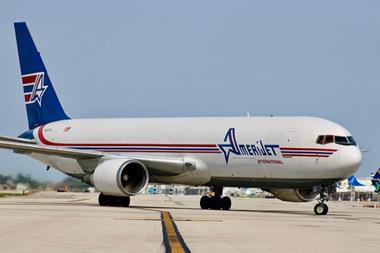US freighter operator Amerijet is looking to the future after a difficult 12 months that have seen the airline restructure its business and fleet.
Speaking to Air Cargo News, chief executive Joe Mozzali said that the airline’s troubles stemmed from there being too much capacity in a slowing air cargo market over the last couple of years and the loss of three of four key contracts with the US Postal Service and DHL.
The difficulties resulted in the carrier reporting a loss of $58m last year while revenues were down by around 17% compared with the prior year, according to the US Bureau of Transportation Statistics.
However, Mozzali, who took over as chief executive in October last year, said there was positive momentum in the market in the latter part of 2023 while the carrier has been busy re-focussing its scheduled service strategy around network optimisation and also looking to capitalise on the on-demand market.
The strategy is centred around three core elements, explained Mozzali: Protecting and growing the core scheduled service business while improving customer experience; becoming a relevant player in the Colombia flower market; and aligning its cost structure with the reduced fleet, reduced block hours and current market demand.
He said the company has completed the core of its business restructuring, received a $55m capital infusion from its existing lenders and re-sized its fleet to match demand expectations.
Mozzali said that following the restructuring, the firm’s financial results are improving, although he added that under his leadership Amerijet will always operate in a perpetual “constructive dissatisfied mode” as it continues to hunt out enhancements.

As of April, Amerijet’s year-to-date earnings before interest, tax, depreciation and amortisation (ebitda) margin had reached 5.7% compared with -1.9% a year earlier.
He also highlighted other statistics for the first four months of 2024 showing positive momentum: revenue per block hour has increased 29% year on year, with a 13% increase in tonnage against a backdrop of a 17% reduction in scheduled service block hours.
It has also provided a near 100% completion rate for its customers.
Part of the strategy has centred on the airline identifying new markets to help fill its aircraft, Mozzali said, with Colombia providing a key addition as the carrier capitalised on flower volumes by tagging on a call in Bogota to its flights between Miami and San Juan.
By the end of May, Amerijet had operated more than 200 flights to support the flower market in Colombia, of which close to 120 were operated to support Mother’s Day flower demand.
Meanwhile, the airline has also been more proactive in the on-demand market, providing charters for forwarders, cover for airlines when their aircraft are undergoing maintenance or c-checks, as well as short-term ACMI flying on behalf of a global integrator.
“We are working very well cross-functionally on our scheduled service network,” Mozzali said. “We listened to customers, we listened to our salesforce and we are putting the right capacity in the right markets and we are remaining agile.
“If we need an extra section in a certain market, we will do that and we will combine certain markets to have a balanced load north and southbound. We feel really good about where we're at from a market standpoint.”
The fleet changes saw the carrier offload its six older Boeing 757 freighters, while it slimmed down its Boeing 767 freighter fleet to 12 aircraft from a peak of 18 in 2023.
Three of its current 767 freighters operate on behalf of Maersk Air Cargo.
Mozzali said there are no plans to add or remove further freighters and the fleet of 12 767s is optimal.
“The main thing that I've seen during the year and a half that I've been here is you can't get over your skis with capacity,” he said. Adding: “We are going to be very surgical and very proactive with our fleet and right now the 11-13 range is going to be a good landing spot.”
With the slimmed-down fleet and associated reduction in scheduled block hours also came a reduction in non-crew staff numbers – a 19% reduction in headcount since July 2023.
The company also set up a shared service centre in Trinidad and Tobago last year to move some of the finance work into Port of Spain.
However, he stresses that the company avoided the need to furlough any of its pilots despite the loss of the three USPS contracts resulting in a “short-term crew excess”.
“By working collaboratively with the Air Line Pilots Association (ALPA), we have been able to mitigate the situation without furloughing a single pilot,” he said.
“The company offered leave of absence, vacation incentives, month on/month off, and if we didn't get a lot of participation, then yes, there could have been a furlough, but we had good participation and a good collaboration.”
He added the current pilot contract has two years to run and its crew attrition, despite the situation, has been minimal, which helps provide continuity of service.
“Having that stability of the [pilot] contract, unlike some of our other competitors that are going through various labour negotiations, is a good value proposition for Amerijet,” he said.
Looking at future investments, Mozzali said the next focus will be on the technical operations maintenance platform and improving the customer experience.
Improving the customer experience ranges from booking through to tendering and keeping truck waiting times down.
“On-time performance is certainly one key element of value chain and then how quickly customers can get shipments out for delivery when they arrive at destination.
“That is an area of focus, whether it's investments in our website, our booking platforms or our customer service experience.”
Mozzali joined Amerijet as chief financial officer after working for UPS for more than 30 years in a wide variety of roles in the US and Europe, including heading up the integrator’s Kiala collection point network.
He says he brought the UPS focus on cost discipline and its “constructive dissatisfaction” approach to Amerijet but adds that serving customers in a cost-effective manner is also key to success.
To conclude: “I think that post-restructuring, we're coming out stronger than we were and we are now making money from an ebitda perspective - I don't think the banks would have put in restructuring dollars if they didn't feel confident in the business model.
“We've been around for 49 years in a Caribbean market, which is very challenging. So we're very resilient and taking my pedigree at UPS and combining that with what Amerijet does so well, I think it’s a good match.”













